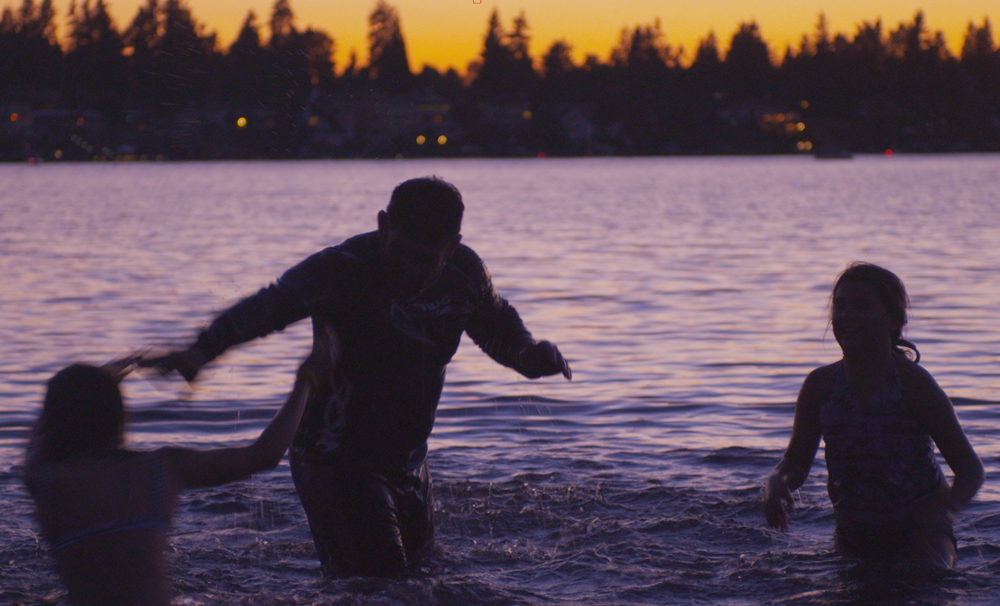It wasn’t long after arriving in downtown Columbia, Missouri to know that I was in for the most interesting film festival I’ve ever been to — no other community seems as unanimous in their support of such an event or as welcoming of visitors to mix in with the locals who show up en masse for screenings of films that may be obscure even to documentary fans. But arriving at my first screening a the Picturehouse, a makeshift theater set up in a church confirmed it. As you enter, you can look to your left to see large panels on the walls on which residents of Columbia can be seen dancing against a white background. Straight ahead, there’s a musical act to serenade you – in my case, Anni Rossi, a chanteuse from Brooklyn who loved her experience so much last year, she was back in town to busk. (Note: If you come to True/False, bring singles since hats are passed amongst the crowd just before the screening starts to repay the musicians for their merrymaking.)
Singing while clutching a viola and tapping her left foot on a kick drum, Rossi was managing a balancing act not unlike the festival’s organizers who create an all-encompassing feeling that art is all around you in every day, whether it’s the musical pre-show entertainment or in the streets downtown connecting the festival venues that are lined with sights and sounds all alive with creative possibilities. Still, this doesn’t overshadow the films, but only further emphasizes what nonfiction filmmaking should be – innovatively interpreting reality to reveal a greater truth.

With a devilish grin reminiscent of Jeffrey Dean Morgan, Joe can get away with a lot, but with Unay’s camera always in the right place at the right time, you come to understand that he struggles with that leeway since his passion for fighting, which came from a difficult youth, stems from a fear of the unknown which he’d surely face if his family falls apart. Superbly edited by David Teague, the past creeps into conversations naturally in “Cage Fighter” to give the context to why everyone in the film has the perspective that they do, setting up for some surprising story developments, and any time the camera diverges from Joe, which is rare, it’s significant, capturing raw and extraordinarily revealing moments with Norinda and daughters Delanne, Kira and Callie, who vent their frustrations to each other with wisdom far beyond their years. Although he couldn’t have possibly known what he was embarking on when he struck up a conversation with Joe at a local yoga studio, Unay has made an emotional powerhouse that audiences will feel as reluctant to leave as Joe does about fighting.

At first, I felt a distance from “Did You Wonder Who Fired the Gun?”, with an opening invoking “To Kill a Mockingbird” to place an audience in the South Wilkerson grew up in, which given the way the filmmaker was deconstructing cinema by sitting just beneath with his face illuminated by his open Macbook was slightly disorienting. But the moment passes quickly as the stark and arresting black-and-white images from Wilkerson’s travels across the Deep South seize the screen just as the filmmaker’s live narration takes hold of your ears. It pulls you closer as Wilkerson restores the standing of the man killed by his kin to history and places him within the broader context of the civil rights movement, though as the filmmaker takes great pains to acknowledge from the start, “This isn’t another white savior story. This is a white nightmare story.” Indeed, what Wilkerson finds grows more chilling by the minute, illustrating not only Spann’s unconscionable death but how the fact of his life was systematically erased until he was left in an unmarked grave, a fate all to common for too many African-Americans and though the filmmaker voices concern that this was not his story to tell, you’re truly grateful that someone did and truly moved by the way Wilkerson chose to tell it.
One of the most pleasant surprises of the fest so far was Chloe Domont’s “All Good Things,” which nestled in the middle of the shorts program, “The New Family” truly felt like a gem. As the film begins over a contentious conversation over what to get for dinner between Maria and Don, you’re unaware that these two bickering over what kind of shrimp to order from the local Chinese restaurant (itself a point of argument) are the filmmaker’s parents, something that Domont shrewdly reveals moments later when Maria asks the person behind the camera, “When are you giving mommy a grandchild?” As if the tension provided by the tenor of conversation wasn’t high enough, announcing the filmmaker’s relationship to her subjects raises the stakes considerably as you come to learn that David, the British gentleman staying with Maria and Don is actually Maria’s boyfriend and Domont begins to unwind how this unusual arrangement where all parties seem to be (relatively) content came to be. Besides having three wonderful central characters to follow without ever leaving their apartment just off the Sunset Strip in Hollywood, the film is cleverly constructed to acknowledge family eccentricities the way you might discuss a crazy relative at Thanksgiving when they’re not in the room, but keeps circling back to how they’ve made it work over 28 years – give or take, as Maria guesses at one point. Their clear affection for each other becomes ours for them.




